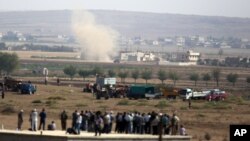Islamic State militants are continuing their advance on the northern Syrian town of Kobani near the Turkish border, where Kurdish fighters have been struggling to repel them for weeks.
The assault has forced more than 160,000 Syrians to flee into Turkey. On Friday, Islamic State shelling continued to bombard the outskirts of the Kurdish town known as Ayn al Arab, despite recent airstrikes by the U.S.-led coalition formed to combat the extremist group.
The coalition has been bombing the militants' positions for weeks, but has made little headway. Turkey has also vowed to do whatever it can to keep Kobani from falling to IS fighters.
The White House Friday welcomed the Turkish parliament's vote Thursday authorizing Turkish military activity against Islamic State in both Syria and Iraq.
White House spokesman Josh Earnest also praised contributions by Australia, Denmark, and the Netherlands to contribute fighter aircraft.
He said the U.S. will continue to work with its international partners to expand its approach "to degrade and ultimately defeat" the Islamic State fighters.
Australia Joins Coalition
Australia, meanwhile, on Friday approved joining the air campaign in Syria, as well as deploying special forces.
Prime Minister Tony Abbott said it was in Australia's interest to help defeat the extremist group, which he referred to as a "death cult."
“It is in everyone’s best interests that the murderous rage of the ISIL death cult be checked and rolled back, and that is what we are determined to do,” Abbott said. “ISIL has declared war on the world, ISIL is launching an assault on civilization, not just upon the people of Iraq right now.”
Australian troops will not likely be directly involved in combat missions, but he warned the deployment "could be quite lengthy, certainly months rather than weeks.”
Australia has already sent 400 air force personnel, 200 special force soldiers and 11 aircraft to the United Arab Emirates in preparation for the impending operations.
The government estimates 160 Australians are either fighting with or supporting the Islamic State, which has set up a self-declared Islamic caliphate in parts of Iraq and Syria.
Abbott refused to say whether his country would also consider joining U.S. and Arab countries in striking Syria targets
New laws have also been introduced to the Australian parliament giving the authorities greater powers to combat the threat of homegrown extremism. Last month, a teenage terror suspect was shot dead by police in Melbourne after two officers were stabbed.
Kurdish Concerns
Kobani’s defense chief, meanwhile, that a large-scale massacre by Islamic State militants is imminent without international aid.
In an interview with VOA's Kurdish Service, Ismet Sheikh Hasan also said Kurdish defenders felt abandoned by U.S.-led coalition forces, despite the airstrikes.
VOA's Phil Mercer contributed to this story from Sydney, Australia.





